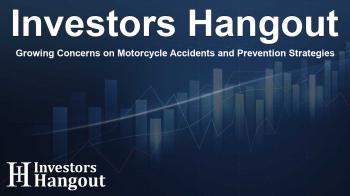Growing Concerns on Motorcycle Accidents and Prevention Strategies

Understanding Motorcycle Accidents: Key Insights
Recent discussions have highlighted a troubling trend: motorcycle accidents are becoming increasingly common, leading to severe injuries and fatalities. A recent report emphasizes the dangers motorcyclists face on the roads, stressing the need for awareness and safety measures. These accidents are not just statistics; they impact families, communities, and the very fabric of society.
The Grave Reality of Motorcycle Accidents
Motorcyclists face significantly greater risks compared to traditional vehicle occupants. They are 28 times more likely to die in a crash, a stark statistic underscoring the urgent need for effective safety measures. The rising number of motorcycle-related incidents shows a community that must respond to this pressing crisis.
Identifying High-Risk Areas
While motorcycle accidents can occur anywhere, specific environments seem to foster more incidents:
- Urban Intersections: These locations pose unique risks with busy traffic patterns and complex signals. Motorcyclists are often not seen by other drivers, making them particularly vulnerable.
- Rural Highways: Open stretches of road can tempt riders to exceed speed limits, where the lack of lighting and narrow shoulders can result in deadly accidents.
- Congested Freeways: Heavy traffic and frequent lane changes increase the chances of accidents, especially during sudden stops.
- Seasonal Hazards: Weather changes like monsoon storms pose serious threats by lowering visibility and creating slippery conditions.
Understanding the Causes
The prevalence of motorcycle accidents can be traced to several contributing factors:
- Speeding and Inexperience: Recklessness combined with lack of proper training leads to devastating outcomes.
- Distracted Driving: Drivers who are not fully attentive can easily overlook motorcyclists, leading to catastrophic accidents.
- Road Hazards: Poorly maintained roads can become life-threatening for motorcyclists, making awareness and caution vital.
- Alcohol Impairment: Intoxication decreases reaction times and impairs judgment, frequently linked to serious accidents.
Strategies for Prevention
The good news is that many motorcycle accidents can be avoided. Here are effective strategies to enhance rider safety:
- Use Protective Gear: Wearing a helmet and protective clothing significantly decreases the risk of major injuries.
- Practice Defensive Riding: Stay visible, anticipate the actions of other drivers, and maintain a safe distance.
- Regular Training: Continually honing riding skills is essential for adapting to road conditions and improving safety practices.
- Vehicle Maintenance: Regular checks on a motorcycle’s condition ensure safe travel at all times.
- Public Awareness: Encouraging car drivers to be vigilant for motorcyclists can reduce accidents significantly.
Broader Implications of Motorcycle Accidents
- Healthcare Costs: The financial burden from motorcycle accidents is enormous, as injuries lead to significant healthcare expenses borne by both individuals and healthcare systems.
- Economic Impact: Traffic-related injuries result in downtime for workers, affecting productivity nationwide.
- Age Demographics: While younger riders are often implicated in accidents, older riders returning after long breaks can also be at risk.
- Emergency Response Challenges: The pressure on healthcare systems increases during peak riding seasons, illustrating the critical need for proactive safety measures.
About Accident Hotline
Accident Hotline is a dedicated personal injury law firm focused on assisting victims of motorcycle accidents and various personal injury cases. Their comprehensive approach to client care ensures that those affected can pursue the compensation they deserve, holding responsible parties accountable.
Frequently Asked Questions
What are the primary causes of motorcycle accidents?
Speeding, inexperience, distracted driving, and roadway hazards are significant contributors to motorcycle accidents.
How can motorcyclists minimize their risks?
Using protective gear, practicing defensive riding, and improving riding skills through regular training are vital steps.
Are motorcycle accidents more common in urban or rural areas?
Both urban intersections and rural highways present unique risks, making accidents likely in either environment.
What is the impact of weather on motorcycle safety?
Weather conditions like storms can drastically reduce visibility and increase road hazards, elevating the risk of accidents.
How does accident frequency affect healthcare systems?
The costs related to treating motorcycle accident injuries place a heavy burden on healthcare resources and public health systems.
About The Author
Contact Thomas Cooper privately here. Or send an email with ATTN: Thomas Cooper as the subject to contact@investorshangout.com.
About Investors Hangout
Investors Hangout is a leading online stock forum for financial discussion and learning, offering a wide range of free tools and resources. It draws in traders of all levels, who exchange market knowledge, investigate trading tactics, and keep an eye on industry developments in real time. Featuring financial articles, stock message boards, quotes, charts, company profiles, and live news updates. Through cooperative learning and a wealth of informational resources, it helps users from novices creating their first portfolios to experts honing their techniques. Join Investors Hangout today: https://investorshangout.com/
The content of this article is based on factual, publicly available information and does not represent legal, financial, or investment advice. Investors Hangout does not offer financial advice, and the author is not a licensed financial advisor. Consult a qualified advisor before making any financial or investment decisions based on this article. This article should not be considered advice to purchase, sell, or hold any securities or other investments. If any of the material provided here is inaccurate, please contact us for corrections.

